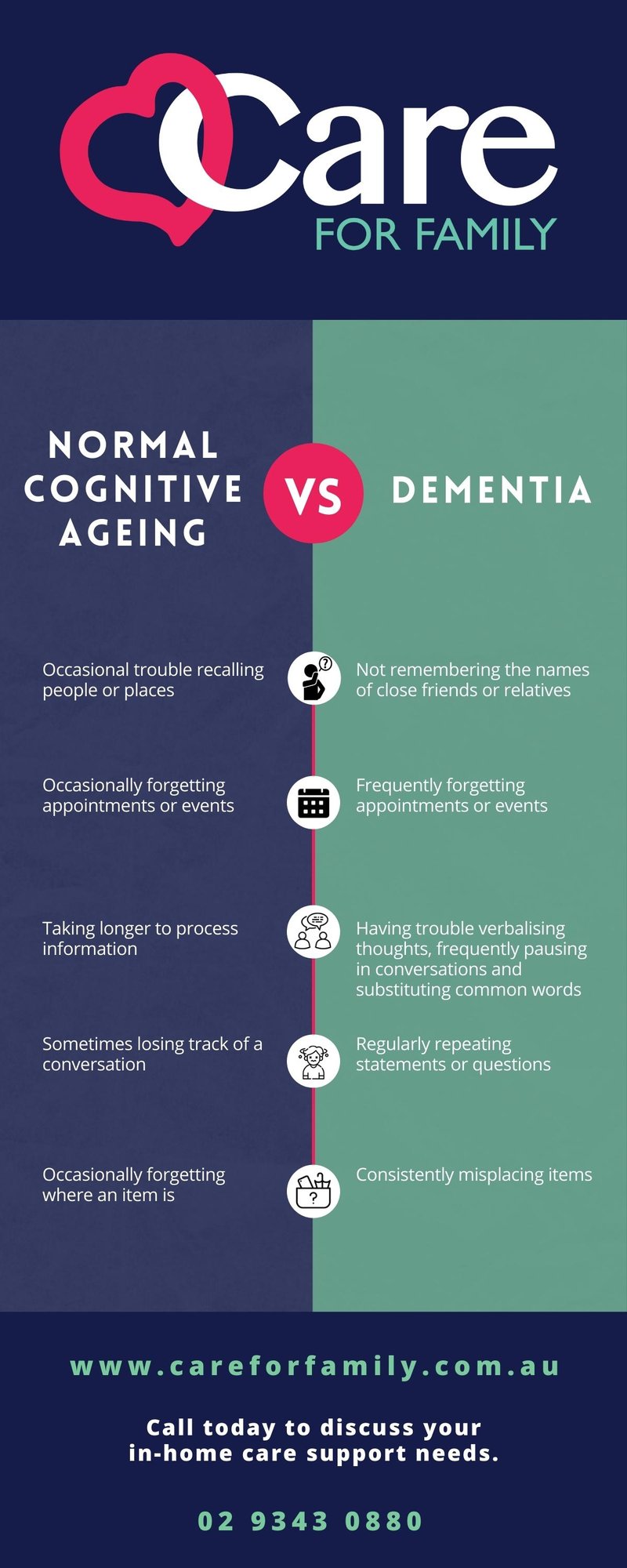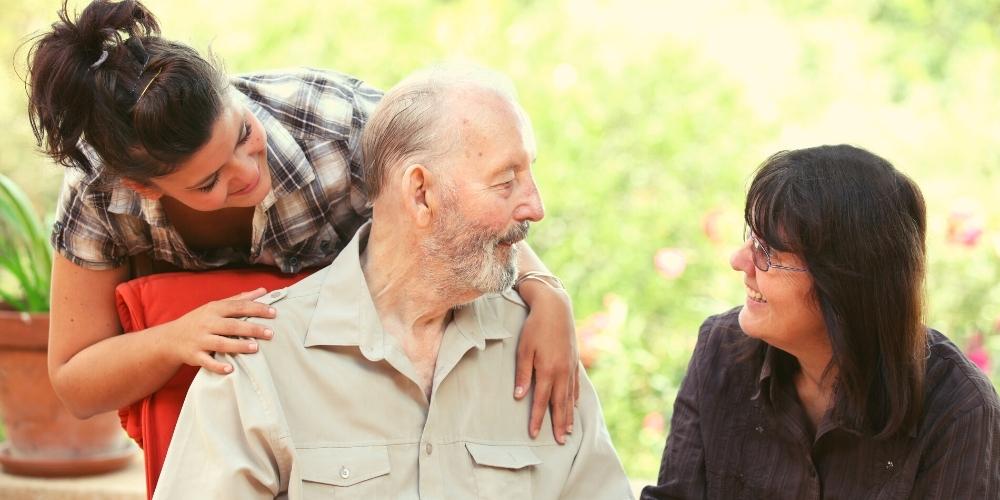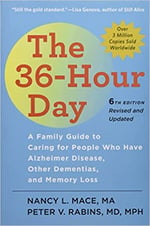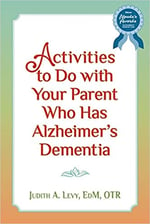Introduction

Currently, nearly half a million Australians are living with dementia, with symptoms ranging from memory loss to difficulty concentrating, mood changes, and confusion. Caring for a loved one with dementia (an umbrella term that encompasses some 200+ types of brain disease) can be incredibly challenging. Thankfully, there are many resources and services available to help those caring for someone with dementia.
Here at Care For Family, we are experts in providing high-quality, personalised care for those living with degenerative brain diseases such as Alzheimer’s, vascular dementia, and more. That’s why we’ve put together a detailed guide on what you can expect when your loved one is diagnosed with dementia. From seeking an early diagnosis for the best outcomes to learning to talk to someone with dementia, to getting some in-home assistance to help with day-to-day living, this guide will help you to support your loved one and ensure their daily needs are being met and quality of life maintained.
What is dementia?

Dementia is a collection of symptoms that appear when there is some damage to the brain caused by diseases, such as Alzheimer's disease. What happens is that the nerve cells in the brain become so damaged that the messages can no longer be sent to the brain properly.
Over 400,000 Australians currently have dementia, with more than 200 types of dementia. The most common types are vascular dementia, Alzheimer’s disease, dementia with Lewy bodies, frontotemporal dementia and mixed dementia.
Dementia usually affects people over 65, although a small number of younger people get diagnosed with it too. While everyone will experience symptoms differently, there are some common symptoms that are usually mild to begin with, and gradually worsen over time.
It’s important to find out if you or your loved one has dementia as early on as possible as it can be a complex and lengthy process to get a diagnosis. The sooner you get a diagnosis, the sooner you can get the support you’ll need.
Dementia statistics
Here are some more dementia statistics that show just how prevalent dementia is in Australia:
- About 55% of people in Australia with dementia are women.
- Nearly 1 in 10 people over 65 have dementia.
- It's thought that there will be more than 589,000 people with dementia by 2028 and over a million by 2058.
- Dementia is the single greatest cause of disability in Australians over the age of 65 years, and the third leading cause of disability burden overall.
- Dementia is the second leading cause of death in Australia and the leading cause of death among Australian females.
- On average, the signs and symptoms of dementia are noticed by families three years before a firm diagnosis is made.
Normal ageing vs dementia

Certain changes to both our minds and bodies are a normal part of ageing - from slower reflexes to aching joints, to reduced mobility, and even some memory loss. In many ways, normal ageing can look a lot like the early stages of dementia. However, distinguishing the signs and symptoms of dementia from those of ageing is crucial for health, longevity, and planning for the future. If you are wondering whether your loved one is showing signs of dementia or simply normal signs of ageing, this article will shed some light.
Normal cognitive ageing vs dementia
Is it dementia, or just old age? The difference is hard to tell and can cause a lot of distress for the family members of ageing loved ones. Having the conversation can be a tough one, so being able to spot the normal signs of ageing as opposed to the common symptoms of dementia is important. Here are some of the basics, when it comes to the normal signs of ageing:
- Some memory loss, including trouble remembering specific details or conversations – especially if they happened a long time ago
- Forgetting things, such as words, or appointments, but remembering them when mentioned
- Slower reaction and reflex times
- Slightly reduced (and gradual worsening of) mobility
- Aches and pains in the joints
- Vision impairment related to ageing, such as cataracts
- Aversion to changes in routine
The symptoms of dementia, especially in the early stages of Alzheimer’s disease or other common types of dementia such as vascular dementia or frontotemporal dementia, can be hard to distinguish from those of normal cognitive decline – as mild cognitive decline is part and parcel of getting older. For example, age-related memory impairment versus dementia can be particularly challenging to spot. Importantly, even though a normal part of ageing, some of these things may be a risk factor for developing dementia down the track, and should be monitored as your loved one grows older.

As with any medical condition, a dementia diagnosis should be done by a qualified medical practitioner. But knowing some of the more serious symptoms to look out for can mean spotting the signs of dementia earlier. Here are some common signs of dementia to keep an eye out for:
- Significant problems with language, such as recalling very common words, that can lead to difficulty having a conversation
- Forgetting more recent events, forgetting faces, or having trouble understanding what’s happening as it’s happening
- Trouble with retaining or developing new skills and knowledge
- Noticeable and significant changes in mood or personality, especially if sudden
- Enhanced irritability, or signs of depression or anxiety that are new
- Signs of being withdrawn, apathetic, or no longer enjoying things the things they once loved
- Trouble with losing items, getting lost, or difficulty with directions to and from familiar places
- More significant slowing of reaction times and reflexes which make things like driving, cooking, or other everyday tasks unsafe
- Greater trouble with vision (including tunnel vision), balance, and coordination, that can make it hard to walk, climb stairs, or generally get around without difficulty

Is dementia normal in older adults?
Although getting older can mean experiencing some similar symptoms to dementia, especially in its early stages, there are stark differences in outcomes for dementia sufferers, compared with those of older adults simply experiencing normal cognitive decline. While some 40% of people over the age of 65 will experience some memory loss, for example, dementia occurs in only 1% of people between the ages of 65 and 74 (increasing to around 27% of people over the age of 95). While dementia is a significant and growing health concern for Australians, it is not nearly as common as many other age-related diseases, such as heart disease, cancer, or diabetes.
Although the risks of developing dementia increase with age, it is by no means a foregone conclusion. That said, knowing the signs, and intervening with medical treatments and planning for the future is incredibly important.
Is knowing the difference between normal ageing vs dementia important?
Knowing the difference between normal cognitive ageing vs dementia can not only help you to identify the condition sooner, but it can also help your loved one to obtain medical treatment that will help to reduce or manage their symptoms, to help maintain their health and quality of life. While there is no cure for dementia, an early diagnosis can enable families and loved ones to plan for the future, in terms of medical treatment, living arrangements, financial planning, and palliative care when required. Not only does this help your loved one living with dementia to enjoy a greater quality of life as their condition progresses, but it also means reducing the stress on their loved ones and caregivers now and in the future.
You can find more information on dementia care planning here.
Some of the most important decisions someone with dementia will make are around living arrangements and care planning. If your loved one would like to remain at home, the right in-home dementia care services are essential. Thankfully, there are a variety of services available to help those living with dementia remain at home safely and happily, continuing to enjoy their lifestyle in their own home; from help with daily tasks such as cooking and cleaning to 24-hour in-home care.
At Care For Family, we know that living at home with dementia can be challenging for both the individuals and their families. That’s why we’ve developed a range of services that can be tailored to help your loved one remain at home for as long as possible. For more information about our dedicated and experienced team, and how we can help you today, get in touch.

Early symptoms of dementia

There are many early warning dementia signs and symptoms, but the most common symptoms include:
Memory loss
One of the most common early signs of dementia is becoming more forgetful, such as forgetting new information. This is because dementia affects short-term memory. The hippocampus supports our memories and memory loss can happen because the hippocampus has become damaged.
Often memory loss will be noticed by friends and family before the person who is experiencing it, as it can happen very gradually.
You might spot that you or your loved one is now forgetting where something that you would usually be able to find, such as your keys have been placed. But it’s important to note that even if you have noticed you or your loved one having some memory problems, it doesn’t necessarily mean that it is dementia, as a diagnosis is only made when someone has at least two other symptoms that are severely affecting day to day life.
Forgetting things can also be part of life and can sometimes be caused by stress, sleep problems or anxiety or depression, so it’s helpful to rule out if there is something else causing memory problems.
It’s common for people with dementia to feel concerned by their memory loss and it can lead people to avoid social situations or reduce some of the activities they used to do in their daily life.

Difficulty concentrating
Another early sign of dementia is that familiar tasks can become difficult to concentrate on and complete. This could be struggling to play a favourite game with lots of instructions or following a recipe. These, sometimes daily tasks, that used to be easy to do can become confusing and take much longer to finish than before.
Difficulty following conversations
Sometimes a person with dementia will now struggle to follow conversations, as they can struggle to find the right words or remember the meaning of words. This can also be the case for watching TV and following storylines and conversations on TV.
They may also forget mid-sentence what they wanted to say and get lost in the conversation. Because of this, they may also become repetitive, so they might repeat the same story, or they might repeat the same questions over and over again, even after they have been answered.
Struggling with a sense of direction
Spatial awareness and a sense of direction often gets worse with dementia and can be a symptom spotted early on. This might be that you or your loved one is now struggling to easily get to places previously visited regularly or being no longer able to follow directions.
Confusion
Dementia can make people feel very confused, as they lose a sense of time and can forget where they are or how they arrived. They can also start to forget who people are and not recognise peoples’ faces. The confusion that arises can lead to difficulty in making decisions, such as choosing what to buy in a shop.
Mood changes
A change in mood can also be a common early symptom of dementia. It can be difficult to spot a difference in yourself, but a family member may notice a mood change such as depression. Feelings of anxiety and confusion are also common. You or your loved one might notice a new lack of interest in previous hobbies and activities that were fun before. This can also mean going out and spending time with other people can become challenging.
As well as mood changes, sometimes a person with dementia can appear different too, such as they might have previously been very quiet and are now loud and outgoing, as dementia affects our judgement.

While forgetfulness can be a normal part of ageing, if you or someone you know spots some of these symptoms and they aren’t getting better, talk to your GP.
You can also carry out a Standardised Mini-Mental State Examination (SMMSE) with your loved one. Simply download the PDF tool and the guidance information here.
This is best done under the guidance of a Geriatrician.
Remember, it’s important to find out as early on as possible if the symptoms you or your loved one are experiencing are a sign of dementia as it can be a complex and lengthy process to get a diagnosis. And the sooner you get a diagnosis, the sooner you can get dementia care support.
You can find out more by visiting your GP who will ask about your medical history and run a short test about how your concentration and memory is working. If they suspect you have dementia, they could refer you to a specialist who is likely to carry out more in-depth assessments, blood tests and brain scans.
Talking to someone with dementia

While there are many forms of dementia, it’s a progressive illness that usually causes a significant decline in a person's mental abilities or 'cognitive function' – such as our capacity for memory, thinking and reasoning.
Over time the way someone with dementia communicates will change, as they struggle to remember conversations or what they have done recently. This is because the hippocampus in the brain which takes on new information becomes damaged. So, this means if you have a family member or know a person with dementia, they may forget conversations or plans they’ve arranged.
It can become really challenging to know how to best talk to someone with dementia, so we’ve put together this guide to help you.
Start conversations
As the illness progresses, you might notice that your family member struggles to start or keep a conversation going. So, you could help by starting a discussion. Sometimes the responses will be delayed so you may need to give the person plenty of time to respond to you.
If there are a group of people chatting together, you could help to encourage them to join in by asking a question related to what you’re talking about.
By speaking with shorter sentences, with fewer long words and by taking your time to speak, they’re more likely to be able to follow the conversation.
Using body language
We communicate through body language as well as our words. And you can communicate in lots of different ways through non-verbal communication. For example, if you give eye contact when you’re speaking, your loved one will see you’re communicating with them, even if they don’t understand all of the words. Using visual cues like facial expressions to show how you’re feeling, especially for someone who is struggling to speak is also helpful.
Holding your loved one’s hand while they speak can also help them to feel more at ease. Or by smiling when they speak to you can show that you’re engaged in what they’re saying.
What to do if someone is struggling to speak
People with dementia may find it hard to speak as the condition progresses. It can be frustrating for your loved one when they cannot find the right ways to communicate with you. So, it’s important to positively encourage them to say whatever they can. This will help them feel less worried about speaking and will encourage them to communicate with you.
It is also important to remain calm as they might need extra time to respond or to find the right words they want to say.
You could also try rephrasing questions if your loved one doesn’t seem to understand the question. Or you could try offering simple options for them, rather than leaving a question open to interpretation with lots of different ways to answer it.
If they respond to your question, but don’t give you a clear answer, you could try and encourage them to say more about what you’re discussing. This could lead to your question being answered.

Routine
As short-term memory is affected by dementia, helping your loved one to set up a routine they keep to every week can help them remember what they do each day. So, for example, you could arrange to call or visit them every Wednesday evening.
Listening
If your loved one has dementia, as their condition progresses, you may need to listen more attentively than before so you can understand them.
This is sometimes known as active listening and there are certain techniques you can try which will help such as:
- Give your full attention when they’re speaking.
- Always use eye contact when they’re talking.
- Turn off background noise, such as the TV or radio so you can concentrate on their words.
- If you’re unsure of what they’re trying to tell you, you could check with them what you think they mean. If you have misunderstood them, this gives them the opportunity to correct you.
As well as these general practical tips on how to talk to someone with dementia, as dementia progresses so will their ability to communicate. So, we’ve put together these tips on how to communicate during the different stages of dementia.
How to talk in the early stage
During this stage, you’ll probably notice your loved one can still engage in conversation and socialise with their friends. But you might notice that they sometimes struggle to find the right words or tell you a story more than once.
It’s important to be patient and not to interrupt the conversation – even if you think you know what your loved one is trying to say, as with some time and space, they should be able to communicate what they want to say.
If you’ve noticed your loved one no longer seems happy doing everything they used to do, check with them what they feel comfortable doing and help them make changes to their routine if they would like help.
Keep involving your loved one in the conversation, rather than speaking to another family member or caregiver on their behalf.
Talking in the middle stage
This stage usually lasts for the longest amount of time. During the middle stage, you might notice you need to adapt how you were talking to your loved one in the early stage as they start to struggle to communicate with you.
At this stage, you may find it’s helpful to keep good eye contact while you speak and speak clearly and slowly. Group conversations might now be too challenging, so it will probably be easier to talk to your loved one on your own somewhere quiet.
If you ask your loved one any questions, only ask one at a time and wait for them to answer before asking another one, as this can be confusing for them to answer. And if you give any instructions, you could try explaining one at a time or writing them down and going through them together.
Your loved one might get confused and frustrated trying to communicate, so it’s important to avoid arguing maintaining a calm tone of voice if you can. Or you might find that changing the conversation or what you were both doing, could help calm them down.

Music & Art Therapy for communication
Music can be a powerful tool. Studies have shown music may reduce agitation and improve behavioural issues that are common in the middle stages of the disease. Even in the late stages of Alzheimer's, a person may be able to tap a beat or sing lyrics to a childhood song. Music provides a way to connect, even after verbal communication has become challenging.
Art projects can create a sense of accomplishment and purpose. They can provide a person with dementia, as well as their carers, an opportunity for self-expression.
Source: www.dementia.com.au
Talking in the late-stage
Once your loved one reaches the late stage of dementia, you may find there is very little verbal communication and they are now receiving full-time dementia care. So, during this stage you’ll find using non-verbal cues such as facial expressions like smiling, eye contact and touch are helpful here.
You can try to encourage non-verbal communication with your loved one by smiling, pointing or by making gestures. Keeping them company is also important, even if you can no longer talk to one another anymore.
While there are some common difficulties when it comes to communicating with someone who has dementia, everyone will experience it uniquely. We hope you may find some of our suggestions for how to talk to someone with dementia helpful and we’d love to hear if you have any tips that worked with your loved one.
If you would like to find out how we support dementia and Alzheimer’s disease with in-home care visit our service page. Or to find out more about dementia support available visit the Alzheimer’s Association.
Talking with a parent about dementia

If you suspect your parent has dementia or they’ve recently been diagnosed with it, it can be difficult to know how to talk to your parent about it. Also, because dementia affects memory and the way we communicate, a person with dementia may not fully understand that they have the condition which makes it even more challenging.
It’s thought that around 250 people in Australia get dementia every day and it usually affects older adults. While there are different forms of dementia, it’s the general name used to describe symptoms from a variety of long-term illnesses that create memory loss and a decline in other behaviours such as communication skills and the ability to be rational.
In this section, we’ll take a look at how to talk to a family member or a parent about dementia.
Preparing to talk to your parent
It can be daunting to talk to your ageing parent about dementia, especially if you feel they don’t fully understand it or believe there is something wrong with them. While it might be easy to put off having a conversation about dementia, if you would like to discuss it, the earlier you do the better. This is because as dementia progresses, their ability to understand what it is, along with their ability to talk about it will, unfortunately, deteriorate over time.
Before you speak to your parent, some people find it helpful to do some research about dementia, so you have a good understanding of what it is. Dementia Support Australia has created a guide for family carers dealing with people who have dementia and we’ve created the first section in this guide about what some of the early signs of dementia are, which could be helpful if you haven't already read it.
If your parent doesn’t have a diagnosis but you’ve noticed they’ve been forgetting things recently, you could first find out from them if something else could be causing this, such as stress or tiredness before mentioning you suspect they have dementia. Healthdirect also has helpful information and videos about other symptoms associated with dementia you could check out before speaking to your parent.
Also, think about who should be involved in the conversation. For example, you may like to have another family member with you or if your parent has any other adult children, it could be helpful for them to join the conversation too, so you have some extra support.
Talking to your parent
Memory problems are common signs of dementia, so it’s likely your parent will forget conversations or places they’ve been to with you. This is because the part of the brain that helps us create new memories has been damaged. So, when you speak to your parent, it’s good to try to remain patient if they forget these things.

Using good communication skills can also help, such as using eye contact with your parent when you speak or when they are speaking can help to engage them.
Try not to interrupt them when they do speak as they could forget what they were trying to tell you. Listening carefully to what they’re saying without any background noise can help and if you don’t fully understand what your loved one is saying, you could double-check the meaning or ask them to repeat what they’ve just said.
While people with dementia will respond differently to some of the symptoms they get, such as memory loss, it’s common for people to become concerned or irritated by the changes. If your parent has noticed some of these changes, it can be helpful to ask your parent to talk to you about them.
If they haven’t yet had a diagnosis, now could be the time to calmly suggest talking to their doctor about these difficulties. You don’t have to mention dementia with them if you feel this will worry them unnecessarily, but you could simply suggest talking to a doctor and offer to go with them if that helps.
Making helpful changes
Allow them to share with you any of the difficulties they’re facing and see if together there are any changes you can work on to make their life easier. For example, it might be setting a routine call each week to make it easier to remember than speaking at different times.
Your parent may feel there are lots of things they can no longer do and that transition can be hard to accept. But it’s also useful to think about what your parent is still able to do. For example, they might find that communicating among a large group of friends is confusing. But getting together with friends in a smaller group is better, as the conversation is easier for them to follow.
While people with dementia often find conversations harder to keep up with, you could help them find activities to do with other people that rely less on talking, such as an art class or these other activities for elderly people with dementia. This will help them be able to spend time with others without being worried about following lots of different conversations.
Creating a routine
Creating a routine with your parent could help them remember what is going to happen each day. You could speak to them and create a plan together in a diary or by sticking post-it notes around the home, so they can see what is happening. A good example of this is having a note stuck up on the front door or nearby wall to remind your parent to remember to take their wallet and keys with them if they’re going out.

You could also suggest they write or keep mementoes of what they’ve done each week, so they have a record of what they’ve been doing. This can be a great way of starting a conversation with them when you next meet up.
While we’ve covered some tips on how to talk to a parent about dementia, it’s important to remember that everyone experiences dementia differently and you might think of other ways that you know will work best with your parent.
For more information, the Dementia Centre and Dementia Support Australia give free support and advice to people who care for someone with dementia.
Challenges of being a dementia carer

Receiving a dementia diagnosis, although challenging for the person being diagnosed, is also often just as overwhelming for their loved ones. If your loved one has recently been diagnosed with dementia, you probably have many questions, fears, and a lot of uncertainty about what lies ahead. Not least of which is, ‘What are the challenges of caring for someone with dementia?’
Dementia challenges range from the physical to the financial, to the emotional, and beyond. Despite the many dementia-related challenges that lay ahead for both you and your loved one, being prepared with as much information as possible will help you best prepare for whatever the future may bring.
Physical dementia challenges
Perhaps the most obvious of challenges of caring for someone with dementia are the physical challenges. Depending on the type of dementia your loved one has been diagnosed with, they can expect a range of physical changes to occur. These might include reduced mobility, loss of motor functions, disrupted sleeping patterns, difficulty using the bathroom themselves, incontinence, or problems with doing day-to-day tasks such as cooking, cleaning, or getting to the shops.
Dementia is a degenerative condition that results in both cognitive and physical deterioration. As these symptoms worsen over time, the challenges of caring for your loved one will evolve and change with their disease. Some of these physical manifestations of dementia may not arise for years to come, but it is best to prepare in advance to support your loved one to continue living the way they hope to for as long as possible.
Being prepared for these physical challenges may mean making modifications to the home to make living at home safer for your loved one or enlisting the expert help of a professional care service such as Care For Family, to assist with everyday living, and more. To be armed with the best information about what to expect in terms of physical challenges, speak with your loved one’s doctor and specialists about what to expect from their specific condition; from the stages of dementia, to dementia symptoms related to your loved one’s specific condition, to the types of health and social care available, and whether any referrals or doctor’s documentation are required.

Practical dementia challenges
Alzheimer’s disease and other forms of dementia certainly come with their fair share of practical challenges, from advanced planning in terms of power of attorney, to living arrangements, to organising care assistance from the relevant support services – just to name a few. One of the most important things you can do as a loved one and caregiver of someone with dementia is to plan in advance for the things to come. This means having a detailed conversation, as soon as possible with your loved one, to understand their wishes for their care.
The discussions may include their finances, their living situation as their disease progresses and how they wish to be cared for. Knowing your loved one’s desires can give you the assurance that as the caregiver you’re able to act upholding their wishes.
Consider these kinds of questions:
- Does your loved one wish to remain at home for as long as possible?
- How can you support them to remain at home?
- Do you have the capacity to offer the type and amount of care they need now and will need in the future?
- Is there extra support you can call upon from other family and friends, support groups, or dedicated care services like Care For Family?
- Would certain home modifications make it easier and safer for your loved one to remain at home?
- Has your loved one considered moving to a residential care facility, and at what point would they wish to do so?
- What aspects of their lifestyle does your loved one hope to continue enjoying, and how can you or a support service help them to do so? (This might include social activities, religious services and events, and more.)
Financial dementia challenges
The financial challenges of caring for someone with dementia can be complicated and nuanced. Thankfully, there are nationwide programs available from the Australian Government to assist in caring for your loved one as their condition progresses. Many of these programs, including aged care support and the NDIS, are not means-tested, which means that your loved one does not have to face the prospect of selling the family home, for example, to receive support. In fact, these programs may allow your loved one to remain in their home and receive specialised support to help them continue to live there safely.
For people with dementia under the age of 65, the NDIS offers a range of financial support options, including funding for care services. This funding is also not means-tested, which means that assistance is available to all Australians living with a permanent and severe disability (including dementia), regardless of their financial situation.
For those living with dementia over the age of 65, the Australian Government offers assistance in the form of the My Aged Care service. Designed for older Australians who need some extra help living at home, including those with dementia, the Home Care Packages under the My Aged Care service can support with a massive variety of services, such as:
- In-home assistance with domestic tasks such as cleaning, cooking, and more
- Personal care, including grooming, toileting, etc.
- Companionship services
- Transport services, including to doctors’ appointments, social events and shopping
- Financial support for home modifications
- Assistance with taking medications, including nursing services from a registered nurse
- Help with the weekly shopping and gardening
- Palliative care services
For more information on Home Care Packages and the types of support that we at Care For Family can offer, visit our Home Care Packages page.

Challenges for carers
An often-overlooked challenge of living with dementia is the toll it can take on family members and carers. Whether you are the primary caregiver for your spouse or parent living with dementia, or a family member or friend assisting where you can with your loved one’s care, it can be incredibly challenging, physically, emotionally, and mentally. The symptoms related to these challenges can include:
- Anxiety and depression
- Increased stress levels
- Irritability
- Isolation from friends and family
- Disrupted sleeping patterns
- Exhaustion and fatigue
- Changes in appetite or weight, to name a few
It is estimated that 1 in every 11 Australians is a carer today, and that all carers will experience burnout at some point. That’s why it’s so important to ensure you are taking care of yourself; whether that means taking a much-needed break from caring once in a while (utilising respite care services, for example), to finding support in the form of counselling or support groups for carers. The challenges of caring for someone with dementia are many and varied. Although ensuring your loved one is living as safely, healthily, and happily as possible is incredibly important to you, your own wellbeing should not be overlooked.
As an expert and trusted in-home care service provider, the team at Care For Family knows better than anyone the challenges of caring for someone with dementia. That’s why we’ve put together a range of care services aimed at supporting both your loved one with dementia and you as a caregiver in living life to the fullest, despite a dementia diagnosis.
Our compassionate and dedicated team is highly experienced in providing care for those living with dementia to support them to live at home for as long as possible. For more information about how we can help your family to support your loved one, from creating a dementia care plan, to organising in-home support – even at short notice – and more, browse our range of specialised services, or get in touch with our team today.
Help for a parent with dementia

You may have a family member or an ageing parent who has had a diagnosis of dementia or Alzheimer’s disease. But how can you get the right kind of dementia care?
In this section, we’ll take a look at how and where you can get support for your loved one with dementia.
While there isn’t a cure for dementia, people can live for many years and getting the right kind of support can make a real difference. At first, it can seem a bit overwhelming trying to work out how to get the best help for your parent, as you may deal with many people from GPS, nurses, counsellors and allied health professionals.
But finding the right kind of support can mean your parent will be able to remain at home and enjoy a good quality of life for as long as possible. Some services are free and some you need to contribute to. It’s worth checking out My Aged Care or calling the National Dementia Helpline on 1800 100 500 to find out more about what kind of support will be helpful. We’ve also added an overview of what some of that support looks like below to give you an idea of what is available.
There are different stages of dementia and depending on what stage your loved one is at will depend on what help they need. One of the challenges of caring for a person with dementia is that it is a long-term condition and that with cognitive decline, the kind of help needed for a parent with dementia will change over time.
What support is needed in the early stages of dementia?
If your parent has had an early diagnosis and they are in the early stages of dementia, you might notice that your loved one has become more forgetful, struggles to concentrate on conversations and has lost their sense of direction. During this stage, you could offer support to help them, such as helping them to set reminders to attend appointments or taking them to places they regularly visit that they’ve forgotten how to get there.

Pharmaceuticals and groceries can be bought online all over Australia, which can make shopping less stressful. If you’re not sure about a grocery provider, ScamWatch has detailed information about how to avoid online shopping scams.
Everyone has access to bulk-billed telehealth services. This means that any medical concerns can now be discussed over the phone, or by video chat. During a consultation, the doctor can write prescriptions, and send them to your pharmacy or directly to you. If you’d like to arrange a telehealth consultation for your loved one, make sure you have their Medicare card and call their practice in the same way you’d book an ordinary appointment.
If you struggle to find a telehealth provider, you can speak to My Aged Care.
Legal support
You may want to discuss what legal support your parent will need in future. It could be that their will needs writing or updating and the early stages of dementia is a better time to look at this before it progresses.
A will allows your parent to decide who will inherit anything they own after their death. A solicitor can help your family put a will together.
And as well as creating a will, you may want to support your parent to engage an enduring power of attorney who would make decisions on your parent’s behalf, when they can no longer make decisions themselves. This kind of support can relate to financial or medical support and a solicitor can advise you and your parent how to prepare the relevant documents.
Financial support
As the dementia progresses, your parent may not remember where they keep important financial documents, such as details of their pensions or bank accounts so you may want to arrange a safe place to keep these together and keep copies for yourself in case they get lost.
Remembering PIN numbers for credit or debit cards could also get harder for your loved one, so you might want to help them to arrange a "chip and signature" card. You could also help to set up direct debits for bills such as electricity so that they can’t be forgotten.
Planning care
Knowing that care needs will change over time for people with dementia means that the more you can prepare for this, the better. As your parent shows more symptoms of dementia as they get into the later stages, they may need either in-home care or residential care which requires financial planning and assessing what support you feel will offer your parent the best quality of life.

In the later stages of dementia, most people will need care all of the time. This can be hard to accept, so preparing for this can make it easier to manage when the time comes. If your parent is able to discuss with you what kind of care they would like, this can feel more empowering for them to be involved in the decisions.
At Care For Family, we can offer as little as an hour a day of in-home care for people with dementia and Alzheimer’s. Or we can provide support for your loved one with live-in care. This helpful guide explains the different types of care we can help you with.
Support groups
Many dementia patients find support groups really helpful, as they get to meet other people experiencing similar issues to them and they are able to share any of their concerns.
There are also support groups available for caregivers, so if you’re looking after a parent with dementia you might find joining a group helpful.
Dementia Australia runs support programs for people with dementia and their families. And Dementia Downunder runs free support groups for anyone affected by dementia in Australia.
Local support
As well as support groups, you may find that your local council, state or territory government,
offers other support such as community transport, Planned Activity Group (PAG) programs and senior citizen groups and centres.
Trying new activities
It’s especially important for anyone with dementia to keep their mind active. Dementia Australia runs a series of programs to help exercise the mind and make friends.
While it can feel overwhelming for everyone in the family to get a diagnosis of dementia, we hope this section has given you some ideas on how to get the best help for your parent. And with careful planning and good communication with your parent, you can work together to give them the best quality of life possible.
Nursing home alternatives

Receiving a diagnosis of dementia can be devastating for the person being diagnosed as well as their loved ones. However, much of this devastation is a result of a lack of knowledge around the care options available. In fact, as dementia has become a more common condition in Australia and around the world, care options for seniors and even those with early-onset dementia have come a long way.
Like many Australians, you may assume that a dementia diagnosis means having to move your loved one into an aged care facility or nursing home. Not only can this cause disruption and confusion to your loved one, but it may not be the best place for them. There are, thankfully, a range of nursing home alternatives for seniors living with dementia. In this article, we outline these alternatives to help you and your loved one to make the best decision about their living situation.
In-home nursing home alternatives
As our population ages, dementia continues to become a more pressing health concern for older Australians. And despite the challenges that someone living with dementia will face, a nursing home is not the only option for your loved one. In fact, some people living with dementia would rather stay at home for as long as possible – and many do this very successfully, with some additional support. Here are some of the in-home nursing home alternatives open to your loved one:
Caregiving by loved ones: In the early stages of dementia, your loved one may only require a small amount of help from you or other family and friends to stay in their own home, safely and happily. Family carers are very common in Australia and offering to assist your loved one to remain at home will mean less disruption to their daily lives. This means they can continue to enjoy living in a home they love, maintaining much of their independence and way of life.

In-home care services: As their condition progresses – as dementia is a degenerative disease that invariably progresses over time – they may require more help at home than you and other family and friends are able to provide. That’s where in-home care services can be an incredible help. From assisting with cooking and cleaning, to helping your loved one to get to doctor’s appointments or social events, the right in-home care team can help your loved one to receive any type of assistance they need, to continue living safely in their own home.
Respite care services: Carer burnout is a very real concern for anyone involved in caring for a loved one. And with over 2.5 million (and growing) carers in Australia today, there is more help than ever available. Respite care services are designed to help give carers a break from caring as and when they need it. For an overnight stay, a weekend, or a more extended period, respite care can ensure that your loved one receives exactly the care they need, from a trained and experienced professional; allowing you to take a break for work, a holiday, or simply to recoup and recover, as the need arises.
24-hour live-in home care: For a person with dementia, symptoms will increase over time, meaning that they will require an enhanced level of care as time goes on. 24-hour or live-in care services are available as a care option for seniors who are unable to live safely at home by themselves without 24/7 assistance. From personal care such as grooming, toileting, and bathing, to help with shopping and transport, live-in care workers can help with anything and everything your loved one needs throughout their day-to-day lives. This allows them to remain at home, in their familiar surroundings whilst receiving the support they need to live happily and healthily at home, for as long as possible.

Registered nursing services: For those medical needs at home, in-home care from a registered nurse can be invaluable. From administering medications, to dressing wounds, a registered nurse from a dedicated in-home care service can ensure your loved one’s medical needs are met and provide an excellent nursing home alternative for older Australians living with dementia.

Other nursing home alternatives
Of course, as your loved one’s condition progresses, you may look for alternative types of care for them. Fortunately, there are several nursing home alternatives available, even when living at home is no longer an option. These include:
Assisted living facilities: Unlike a nursing home, assisted living facilities are designed to give older Australians living with dementia a sense of independence, whilst ensuring support is on hand at a moment’s notice. Assisted living communities have a strong focus on building a sense of community, with group activities available, as well as dining halls and recreational activities, so that seniors can enjoy time with others in the community. Although often not designed specifically for those living with dementia, assisted living communities can be a good option in those early stages of dementia.

Dementia-specific care: For many seniors with dementia, a residential care facility may become a reality as their condition progresses and they are unable to remain at home any longer. From low-level to high-level care, there are a range of residential care options available to Australians living with dementia. You can consult Dementia Australia for more information about dementia-specific residential care options here.
Funding for nursing home alternatives
Remaining at home is an incredibly important thing for many older Australians, and often for those living with dementia. Whilst living with dementia will mean needing some assistance to do so, especially in the mid and later stages of the disease, it can be quite safe and even preferable to remain in the home for as long as possible. As dementia becomes an ever-growing health concern for older Australians, the Australian Government continues to offer programs that provide financial support for those who need extra help to manage their condition.

In Australia, there are a range of government funding options to help your loved one receive the care they need at home. These government funding options – including the NDIS (for people under the age of 65) and the My Aged Care program, which includes Home Care Packages (for older Australians) – for people living with dementia can mean your loved one can remain at home, rather than having to sell the family home and move to an aged care facility, whilst it is still safe to do so.
For more information about Home Care Packages or the NDIS, and how Care For Family can help your loved one with nursing home alternatives such as in-home care, get in touch with our friendly team today.
Dementia care plans

A dementia diagnosis can seem like the end of the world for many. And it’s no surprise, given all the horror stories we’ve heard, and the way dementia is portrayed in the media today. Thankfully, with the care options available to people living with dementia in Australia today, a diagnosis of Alzheimer’s disease or another form of dementia needn’t be such a terrifying prospect. In fact, with the help of a dementia care plan, you can ensure that your loved one lives a full and joyous life, for the rest of their lives.
What is a dementia care plan?
The official term we use in Australia for planning someone’s care is advanced care planning. Creating an advanced care plan for dementia, or ‘dementia care plan’ involves thinking about, discussing, and planning for the care that someone will need as their condition advances. Although it can seem like a daunting and even awkward task for everyone involved, creating a dementia care plan is actually a vital and incredibly important tool in giving empowerment to someone living with dementia. A care plan for dementia helps your loved one to express their wishes for their care, empowering them with the tools to ensure their needs are met and that their wishes for their care are heard and recorded. When wondering how to write a care plan for dementia, here are some questions things to consider:
- Your loved one’s goals for their care, their lifestyle, and more
- Their needs, according to their condition
- Their preferences in terms of care, lifestyle, commitments and more
- The services that will be provided or organised for them
- When and how often these services will be provided
- How involved your loved one would like to be in managing their care
- How often formal reassessments will be done of the care plan, especially as their condition deteriorates and more care is needed

While this list may seem fairly straightforward and even clinical, there is so much more to a good care plan. Sitting down to talk about a dementia care plan with your loved one gives them a chance to express their preferences for things such as their passions, religious or spiritual beliefs, their goals for their life going forward, and how their care plan will support these. This might mean that they wish to stay active for as long as possible, and require assistance to attend sporting meet-ups such as their regular tennis game with friends, for as long as possible.
Your loved one might wish to continue attending religious services, with help from their care provider where necessary. They may also express their desire to remain in close contact with their friends and family, and therefore, that social engagements are significant for them and important to maintain. Your loved one may also wish to continue cooking meals for themselves, with a little help, and so, their care plan can include these wishes.
Creating a dementia care plan gives your loved one living with dementia control over their situation, encouraging them to take an active role in tailoring their care to suit their needs and desires. For you as a loved one, on the other hand, a dementia care plan will give you the confidence to know that even as their condition deteriorates, you are acting not only in their best interests but in ways that they have requested. Committing an advanced care plan to record with your care provider in advance of your loved one losing their capacity to do so means never having to wonder, “What would they have wanted?”
Things to ask the doctor about dementia care
If your loved one has received a dementia diagnosis, chances are, you and other family and friends have limited knowledge of their exact condition. In these early stages and beyond, learning as much as you can about their condition can help you, your loved one, and the rest of your family and close friends to know what to expect. More than this, being informed can help you to provide the best support for your loved one living with dementia, by knowing what kinds of care they will need, how you can help, and things to avoid, for example.
Your loved one’s doctor can help to demystify your loved one’s dementia diagnosis by giving you details about their particular condition, as there are many types of dementia, each with different symptoms. They can also help by giving you advice on what to expect in the future. We know that a dementia diagnosis can be confronting and overwhelming for you and for your loved one, so it’s best to go armed with a series of questions for the doctor. These might include:
- What type of dementia are we talking about?
- How far has the condition progressed?
- What are the typical symptoms (such as physical or cognitive impairment) associated with the condition in both the short term and long term?
- What changes in your loved one’s conditions can you expect, and when?
- What types of medications are recommended, and why?
- Are there complementary treatments that may help?
- What other medical conditions, if any, is your loved one experiencing and how may they impact their dementia and care?
- Can your loved one continue to live at home, and with what assistance?
- What types of care are available to your loved one, and from whom?
- Is your loved one eligible for support under the NDIS?
- What community resources are available to assist and support you and your loved one?

Dementia care planning and the NDIS
In Australia, there are a variety of support systems, both privately funded and government-funded, to assist people living with dementia, no matter their age or their stage of dementia.
If your loved one is under the age of 65 and has received a dementia diagnosis (referred to as early-onset dementia), they are likely to be eligible for support under the NDIS, as dementia is considered to be a permanent and significant disability. You can check the eligibility of your loved one under the NDIS here.
However, if they are over 65, there are still government-funded supports available through the My Aged Care service. This Australian government-funded service is the starting point for accessing aged care services, including those needed by someone living with dementia. Through My Aged Care, your loved one may be able to access a Home Care Package, to support them to live safely at home for as long as possible.
Both the NDIS and Home Care Package programs offer support for those living with dementia, including services to assist them in staying at home, should that be their wish. Your loved one may be able to access the following types of services and more:
- In-home domestic assistance with cleaning, cooking, and more
- Personal care support with grooming, toileting, etc.
- Companionship services
- Transport for medical appointments, social engagements, shopping and more
- Financial support for the necessary home modifications
- Assistance with taking medications
- Help with the shopping, gardening, and other daily or weekly tasks
- Palliative care services
- Nursing interventions from a registered nurse, when needed

Here at Care For Family, we are experts in both dementia care and aged care services. No matter which government support category your loved one falls under, or whether their care will be privately funded, we offer a full range of in-home care services, to help your loved one remain at home and living life to the fullest. From 24-hour aged care, to domestic assistance with cooking and cleaning, and everything in between, our skilled and compassionate care team is available at a moment’s notice to give your loved one living with dementia the assistance they need. We can assist you in writing a dementia care plan, to ensure their needs and wants are met now and well into the future.
Reach out to us today to book a consultation or for more information on creating a dementia care plan and getting your loved one the help they need at home today.
Getting power of attorney

Making legal, financial, and healthcare decisions is something that we all take for granted, as far as being able to make them ourselves. However, if your loved one has received a diagnosis of dementia, they may need help in making these decisions in the near or distant future. Receiving a dementia diagnosis can take some time for both your loved one and the rest of the family to process, and can often be overwhelming for everyone involved.
One of the best things you can do for your loved one, and for yourself as a caregiver, is to have a conversation about power of attorney long before it is necessary.
What is power of attorney?
Power of attorney is a legal document designed to enable assisted decision-making for someone either unable to make legal or financial decisions for themselves, or who would like some help in making these decisions. For a person with dementia, a power of attorney agreement means they can rest assured that their appointed loved one can make the best decisions for them if the day comes when they lose the capacity to do so.
There are two main types of power of attorney in New South Wales; these are referred to as general power of attorney and enduring power of attorney. However, there is a third type of appointment that will be just as crucial for someone living with dementia: Enduring guardianship. We break each of these down below:
- General power of attorney: This legal document allows someone to appoint a person or persons to make legal and financial decisions on their behalf, while they still have the ability to do so themselves. This might mean appointing power of attorney to a loved one to help with paying bills while in hospital, or when making trips to the bank is difficult due to mobility issues. The scope of decision-making can be limited by the person appointing the attorney, so that only certain decisions can be made on their behalf. A general power of attorney must cease when the person (‘principal’) loses the capacity to make decisions for themselves.
- Enduring power of attorney: An enduring power of attorney is appointed so that, once a person loses capacity, legal and financial decisions can be made on their behalf. A person diagnosed with dementia can appoint an enduring power of attorney before they lose capacity, if they would like some decision-making assistance at any stage.
- Enduring guardianship: Importantly, in New South Wales, a power of attorney does not have the authority to make decisions concerning the principal’s medical, accommodation, or lifestyle needs. For this, they will need what’s called an enduring guardian.
A power of attorney or guardianship is awarded by completing a standard form, and can only be achieved while the principal still has capacity. If someone loses capacity before a power of attorney has been appointed, NSW law requires that their family or worker must apply to the NSW Civil and Administrative Tribunal (NCAT) to appoint a guardian or administrator, or you can visit the NSW Trustee & Guardian for more information or assistance with appointing a power of attorney or guardian. As this can be a lengthy and complicated process, it is best avoided by appointing a power of attorney well in advance, if possible.
Note on defining ‘capacity’: A person is generally considered to have capacity if they are able to understand the documentation, what it does, and what they are approving. If you’re unsure whether your loved one has the capacity necessary to make these decisions and distinctions, it is best to speak with an attorney and apply through a local court.

When does my loved one need a power of attorney or guardian?
Taking care of a spouse or parent with dementia is not only an emotional rollercoaster, but it can also involve a lot of decision-making. Due to the nature and effect of dementia, a person’s ability to make decisions regarding financial affairs and their healthcare can be greatly impaired. Although, in the early stages of diagnosis, there is so much to process, having a conversation about your loved one’s plans for their current and future needs is an important thing to do. Not only can it help to reassure your parent or spouse that their needs will be met, even when their condition deteriorates, but it can also help to ensure everyone is on the same page and that the decisions you will make later on are in accordance with their wishes.
Even if your loved one has only recently received a dementia diagnosis and shows no signs of needing assistance with making certain decisions, it is best to have this conversation as early as possible. Unfortunately, far too many families avoid having this difficult chat for too long, and it is only when their loved one is well into their disease that the topic comes up.
When it comes to appointing a power of attorney or enduring guardian, the best time to have the conversation is now.
Who can be a power of attorney or guardian?
So long as they are over 18 years of age and have the capacity to fulfil the obligations under the agreement, power of attorney can be appointed to a family member, close friend, solicitor, or the NSW Trustee & Guardian.
When choosing an attorney or guardian, it is important to consider that the person or organisation has the time and ability to commit to making decisions for the principal, will act according to their wishes, will not benefit monetarily from the appointment, can keep accurate records of dealings and transactions, and acts according to any limits or conditions placed on their authority.
If you are considering becoming a power of attorney or guardian for your spouse or parent with dementia, consider carefully your own needs, the time and energy you can commit to the role, and whether you are the person best suited to manage your loved one’s financial, legal, or medical decisions.
Many people choose to appoint a solicitor or trustee, as these types of attorneys or guardians are well-versed in the legality and formalities surrounding power of attorney or guardianship obligations; they may help to relieve some of the pressure from you or your loved one, to allow you to focus your energies on other things such as caring for them and making the most of the time you have together.

Can a power of attorney or guardian be changed or challenged?
YES! It is important for your loved one with dementia to know that power of attorney and enduring guardianship are not set in stone. While your loved one still has the capacity, they are able to change or remove their attorney or guardian by applying to the NCAT. If your loved one no longer has the capacity to do this for themselves, an ‘interested party’ may make the application to change or challenge the appointment power of attorney or guardian.
Receiving in-home support for someone with dementia
When it comes to receiving support in the home for your spouse or parent living with dementia, only an enduring guardian can make decisions for your loved one when it comes to their lifestyle, medical care, and accommodation.
If you’ve been appointed an enduring guardian for your loved one who is no longer able to make these decisions for themselves, we can work closely with both of you to create a dementia care plan and ensure that their needs and desires are being met. This might mean having domestic help with cooking and cleaning, or assistance with shopping, getting to and from appointments, or attending social events. For those who need extra support, we also offer 24-hour in-home care.
No matter what stage of dementia your loved one is at, Care For Family can provide specialised, compassionate, and expert care from our highly trained and dedicated team of care workers. Contact us today to find out how we can assist your loved one to remain at home, safely and happily, for as long as possible.
Dementia patients refusing care

You may know a person with some form of dementia, but what do you do if they are refusing care?
It could be that your parent or family member is in the early stages of dementia and has had a diagnosis of dementia or Alzheimer’s disease, but they feel they don’t need help. While it can be hard to hear that, it’s important to remember it’s actually quite a common response to the diagnosis.
Your loved one may find it hard to accept that they are now living with dementia. Also, they might be worried about the dementia getting worse and experiencing a loss of independence. Or it might be that they’ve not noticed the changes you’ve spotted, such as memory loss which is a common symptom of dementia.
Talk to your loved one
If your loved one is refusing care for their dementia, it can be helpful to talk to them about your concerns. While this can be worrying for you, it’s important to try to stay calm and be as supportive as you can when you speak together, as this will help them to remain calm. Your loved one could be feeling sad, angry and overwhelmed by the diagnosis, so listening to them carefully without judgement will allow them to open up and share some of their fears about dementia. Sometimes sharing how we’re feeling with someone who is acceptant and listens well can make us feel better. So, even if you feel you can’t do anything to help, listening in itself can be very helpful.
If you’re not sure how to approach the topic, you could plan a few pointers beforehand about what you’d like to say and how you could bring it gently into the conversation. For example, if you often talk to your loved one about what you’ve both been up to and they can’t quite remember, this could be a good opportunity to say you’ve noticed they have forgotten a few things recently and that you’re concerned. You may find they brush off your comment, so it could help if you have a few examples of what things they’ve forgotten recently ready to share with them.
Giving choices
Your loved one may be feeling powerless, so think about how you can help to give them choices and make some changes together. This might be asking them what would make them feel better. For example, they may prefer you to visit them in the morning rather than in the afternoon. Or they may now prefer to go for a walk with you, rather than chatting together at home. Being able to follow conversations can get harder for someone who has dementia, so if this is the case with your loved one, they might find walking less stressful.
You could also suggest helping by putting up post-it notes around the house together or setting reminders on their phone to help them remember to do things like their favourite activity or attend a doctor’s appointment.
You could also suggest that the GP might be able to help come up with some other ideas that will be helpful. If this is frightening for your loved one, you could offer to go with them to the GP to support them. If you decide to go to the GP together, it’s helpful to keep a diary and record all of the concerns you have so that they can have the best dementia care possible. This could contain details of days of the week, issues, and times that events have happened.

If your loved one refuses to see their GP and you become increasingly concerned for their wellbeing, you could ask your loved one if they would be happy for you to speak to their GP on their behalf. If this worries them, try reassuring them that GPs understand how to help dementia patients and that you want to get the best possible care for them.
Support for your loved one
Talking to other older adults who understand what it is like to live with dementia can be very supportive and help improve your loved one’s quality of life. It may also help them come to terms with their diagnosis.
Dementia Australia runs support programs across Australia to help people stay active and social. They can also help people who are caring for a loved one who has dementia.
If your loved one is struggling with accepting their diagnosis, counselling can help them to get a clearer understanding of dementia and to learn some strategies to manage their feelings. Dementia Australia also offers access to free counselling support which might be helpful for your loved one.
While Dementia Downunder offers a free support group for anyone in Australia affected by dementia.
They might also like to listen to music as this can have a calming effect or try something relaxing like yoga or meditation.
Care for Family also offers a variety of home care support for people with dementia. If you’d like to find out why it would be helpful to choose in-home care for dementia and when is the best time to look for support, visit our in-home dementia care services support page.
Activities for dementia patients

For elderly people suffering from dementia, finding suitable activities can not only be a great way to keep active and have fun, but can also help to improve brain health, enhance short and long term memory, and have a significant impact on quality of life. Thanks to our decades of experience in the aged care industry, we’ve had the pleasure of supporting many older Australians suffering from dementia to lead happy and fulfilled lives, even as their conditions progress.
We have gained a wealth of understanding around helping those experiencing dementia to lead active lives, as independently as possible, for as long as possible. To help you in assisting your loved one in enjoying life to the fullest, we’ve put together a list of the best activities for elderly dementia patients.
Cooking and baking
Cooking and baking are two of the most popular activities for people with dementia. No matter what stage of dementia your loved one is currently experiencing, they can be wonderfully fulfilling sensory activities. Many dementia patients enjoy cooking in their own homes, and our experienced care professionals can help your loved one to continue to enjoy cooking and baking with the appropriate assistance. From cooking old family recipes to experimenting with new dishes, cooking and baking are not only a lot of fun but are a fantastic way to help adults suffering from dementia to maintain their independence.

It’s also great fun to involve the rest of the family, who can lend a hand and share in the results! Your loved one might like to try some of the simple recipes from this Pinterest collection, put together specifically for Alzheimer’s and dementia patients.
Gardening
Stress-reducing activities for elderly dementia patients can be incredibly beneficial in helping to manage the anxiety and irritability which are unfortunate side effects of cognitive disease. Like cooking and baking, gardening is a very sensory experience and can be relaxing and stress-relieving for Alzheimer’s and dementia sufferers. Depending on your loved one’s level of ability, gardening can involve anything from watering pot plants inside and out, to planting new plants, or even planting, tending, and harvesting a herb or vegetable garden.

Movement activities
According to Dementia Australia, one’s sense of movement and rhythm is often retained longer than most other abilities. In fact, studies show that physical activity may even reduce cognitive decline in older adults. This means that even for those living with advanced stages of dementia, keeping active can improve quality of life, as well as help to maintain and even improve health. Movement-based activities like dancing, exercising, swimming, or simply walking, are great ways to keep your loved one engaged with their body, improve their fitness, and give their brain a boost too!
Arts and crafts
When considering activities that your loved one might enjoy, stimulating activities which offer a sense of purpose and a sense of accomplishment should be at the top of your list. Not only can these types of activities help your loved one to be engaged and fulfilled, but they can also reduce the feelings of helplessness and isolation which can occur in those suffering from Alzheimer’s and other forms of dementia. There are many varieties of arts and crafts which might appeal to the older adult in your life, such as knitting, painting, embroidery, flower arranging, and more. Take a look at our article on Craft Ideas for Senior Citizens for lots of other options.
Jigsaw puzzles
Many people experiencing dementia may withdraw from family and friends due to anxiety and the feelings of isolation that go hand-in-hand with their condition, especially in later stages. Fortunately, there are simple and effective ways to keep them engaged with you and other loved ones, as well as having a great time and experiencing a sense of accomplishment. Projects like jigsaw puzzles are an inexpensive and extremely effective way of keeping elderly dementia patients engaged in a stimulating activity in partnership with a friend or family member. Available in a range of sizes and levels of complexity, there’s a jigsaw puzzle to suit almost any level of ability. Of course, these can be completed alone – but they’re even more fun when younger generations get involved. Jigsaw puzzles can be an excellent way for the grandkids to spend quality time with their grandparent living with dementia and can help to strengthen these relationships and create lifelong memories.
Brain games
One of the most common symptoms of dementia is memory impairment. The loss of short and long term memory can be frustrating and debilitating, not only for those experiencing it but for loved ones too.
Brain games are excellent activities for Alzheimer’s and dementia patients, especially for those in early stages, and for those undergoing memory care treatments. They have been proven to have a positive impact on memory and can even reduce cognitive decline in persons with dementia. Best of all, brain training games can be played almost anywhere, at any time!
There are many great brain games available for smartphones, but if your loved one prefers offline activities, there are options like sudoku puzzle books, newspaper crossword puzzles and more. Take a look at our recent blog, Free Brain Games for Seniors, for a range of great examples that don’t cost a cent. You might even like to take a look at specially curated dementia activity books, such as this one from The Alzheimer’s Society.
Reading
Reading is a wonderful solo activity that can be enjoyed by elderly dementia patients. Whether it’s a great book or the local daily or weekly newspaper, regular reading is not only relaxing, it’s also mentally stimulating. This makes reading a great activity for those who might be experiencing reduced mobility.

Visiting the local library is an excellent excuse to get out of the house, but if your loved one isn’t able to make it out and about as much as they’d like to, having the local paper delivered to the door is an inexpensive and convenient way to keep them well-stocked with reading material. Most local, state and national newspapers offer a delivery service for a small fee.
Scrapbooking
For those living with dementia, keeping the mind active, reinforcing social and family ties, and having a project to look forward to each day are all incredibly important for quality of life, especially as the stages of dementia advance. A wonderful activity that encompasses all these factors is scrapbooking. This low-impact activity is suitable for those with limited ability and is safe for dementia sufferers to complete alone or with a little supervision.
Scrapbooking of family photographs, postcards, and other memorabilia can help your loved one living with dementia to create a visual memory aid of their family, friends, and cherished memories, including favourite holidays, family events such as weddings and birthdays, and more. Not only is scrapbooking a mentally stimulating activity, but it can also be a great conversation starter when the family comes to visit.
At Care For Family, we know that supporting your loved one living with dementia can be challenging. Our experienced and compassionate care workers understand the needs of those experiencing dementia and can assist you in supporting your loved one to live life to the fullest.
Get in touch with us today to find out more about our professional care team and how we can assist your loved one living with dementia.
Tips for travelling with dementia

If travelling is a big part of your life, and that of your loved one living with dementia, there is no reason to stop – at least in the early and middle stages of dementia. Although travelling with dementia can present some new challenges, it is possible to travel successfully, have a wonderful time, and create new memories that you and your loved one will cherish forever. We have put together a few tips on travelling with dementia, to help you make things as smooth and simple as possible, so you can get on with having a great time.
Always plan ahead and in plenty of time
Travelling with someone with dementia is possible and can be a wonderful experience for everyone, so long as you plan ahead – and the sooner the better. When it comes to travelling abroad with dementia, there may be some extra documentation you need to organise (for medications, for example), so it’s best to request these from your loved one’s doctor/s in plenty of time, to avoid any disruptions to your travel plans.
Of course, you can’t plan for every eventuality. But there are a few things you can do to make the journey smoother for everyone, these include:
- Letting your loved one’s doctor know when and where you’re going
- Stocking up on any medications needed for the trip (and potentially having extras, just in case)
- Having a letter from your loved one’s doctor about their prescriptions (this is necessary when taking certain medications to some countries)
- Research any restrictions on travelling abroad with certain medications (check with airlines and with customs for the country/countries you’re visiting)
- Ensure you know where the nearest hospital, pharmacy, and GP are at your destination
- Keep copies of your loved one’s documents, including passport, prescriptions, etc
- Share your plans, including hotels, flights, and itineraries, with family and friends back home

Organise travel insurance for dementia sufferers
Can you get travel insurance with dementia? The answer is generally, yes. However, costs may be higher for insurance with any pre-existing condition. Be sure to shop around for some quotes, as not all travel insurance products are created equal! Check with any current insurers to see if they offer travel insurance options for someone with dementia, as it may be more cost-effective to add a travel policy to an existing insurance policy. You can browse some options for travel insurance for dementia sufferers here.
Communicate your loved one’s needs with hospitality and airline teams
Many hospitality and airline teams have experience in supporting guests with special needs, including those with Alzheimer’s disease or other forms of dementia. There may be special assistance available from airlines, hotels, and restaurants for your loved one, to help make their experience smoother and more enjoyable. Be sure to:
- Get in touch with the airline before travelling, to find out about wheelchair access, special check-in and boarding procedures, and any other assistance they can offer.
- Reach out to hotels and other accommodation in advance to let them know about any special needs you and your loved one may have. It’s also helpful to ask the hospitality staff to refer to your loved one by their name, as this can make their experience much less stressful and create a feeling of familiarity and support for them.
- Ensure your accommodation is wheelchair accessible if your loved one requires the use of a wheelchair.
- Secure a ground-floor room or one that is easily accessible by lift, if your loved one is experiencing reduced mobility.
- Ensure that any dietary restrictions can be met by the hotels and restaurants you’ll be visiting.

Make things as comfortable as possible
For many dementia sufferers, routine and familiar surroundings are key to their wellbeing, and travel can risk disrupting this and causing them distress. That’s why, when travelling with someone with dementia, making things as comfortable, familiar, and stress-free as possible for them is incredibly important. Here are a few things you can do to achieve this:
- Visit familiar destinations that hold special memories for your loved one.
- Try to reduce layover times in airports, or long drives to and from the airport.
- Consider choosing closer destinations for shorter flights, or make your layover stops longer (a few days at least) to reduce and break up travelling times.
- Bring familiar objects such as photo albums, books, a blanket, or a pillow, to make your loved one feel more at home.
- Remain flexible with your plans for activities, as your loved one may need more rest or become weary more quickly when travelling.
- Have enough support available, including travelling with other loved ones, to ensure both you and your loved one living with dementia aren’t feeling stressed or stretched too thin to enjoy yourselves.
- Bring along devices such as an MP3 player (although these are quite old-fashioned now, MP3 players tend to have much longer battery life, can be used easily on a plane or in the car, and are less fiddly for those not familiar with smartphones), smartphone, or tablet, loaded up with relaxing or much-loved music, videos, and games to help your loved one relax and make travelling times more interesting.

Consider respite care options for trips without your loved one
As their disease progresses into later stages, travel may no longer be advisable or even enjoyable for your loved one. It is always best to speak to their doctor about whether travel is still safe and possible, before planning a trip.
Whether or not it is possible for them to travel anymore, if you are caring for a loved one with dementia, you may occasionally want to take a trip without them. This is possible thanks to respite care or in-home care services from expert dementia care providers like Care For Family.
At Care For Family, we know that your loved one’s wellbeing and happiness are your biggest concern. Our specially-tailored dementia care services mean you can rest assured that they are receiving the best possible care, even in their own home or yours, while you take a well-deserved break. For more information on respite care services and 24-hour in-home care from our experienced care team, reach out today.
Best dementia books for caregivers

There’s a common misconception about dementia, that it means a low quality of life for sufferers. Nothing could be further from the truth. In fact, thanks to some wonderful dementia books for caregivers, you can learn to care for your loved one living with dementia, communicate effectively with them, and ensure their quality of life.
What’s more, great dementia books for caregivers can help you best take care of yourself, ensuring you’re able to better care for your loved one and avoid the burnout that affects so many caregivers of those living with dementia.
Why read dementia books for caregivers
If you’re like most Australians, your understanding of the various forms of dementia is probably limited. Because there are many different types of dementia, and their symptoms and causes vary, it’s no wonder that there is a lot of confusion about how to care for someone with dementia.
Thankfully, as research into dementia continues, many great dementia books for caregivers are available. These books on dementia – including books about Alzheimer’s disease and more - provide not only an insight into what you can expect from a dementia diagnosis, but how best to take care of them, ensure their quality of life, and maintain (and even strengthen) your relationship with a loved one living with dementia.
With over 2.6 million caregivers in Australia – and over 235,000 young caregivers – taking care of a loved one, patient, or client with a disability is something that is becoming more and more common. As a result, additional resources are opening up to assist caregivers with taking care of their loved ones as well as themselves. Many of the best books on dementia also give some great advice for avoiding burnout as a caregiver, and ensuring your own wellbeing when taking care of someone with dementia.
Our recommendations for dementia books for caregivers
 The 36-Hour Day: A Family Guide to Caring for People Who Have Alzheimer Disease, Other Dementias, and Memory Loss by Nancy L. Mace & Peter V. Rabins
The 36-Hour Day: A Family Guide to Caring for People Who Have Alzheimer Disease, Other Dementias, and Memory Loss by Nancy L. Mace & Peter V. Rabins
Described as ‘the Bible’ of dementia care, The 36-Hour Day is now in its 6th edition, having been revised and edited with new information and practical tips for caring for a loved one with Alzheimer’s disease or another form of dementia. The book helps families and caregivers to navigate caring for someone with dementia, including explaining the challenges they may face and symptoms to expect. It helpfully also takes a look at taking care of your own emotional needs as a caregiver.
 Learning to Speak Alzheimer’s: A Groundbreaking Approach for Everyone Dealing with the Disease by Joanne Koenig Coste
Learning to Speak Alzheimer’s: A Groundbreaking Approach for Everyone Dealing with the Disease by Joanne Koenig Coste
Joanne Koenig Coste’s book takes a practical approach to caregiving, focusing on the emotional health of both carer and loved one living with dementia. Described as a comprehensive and easily accessible guide, Learning to Speak Alzheimer’s centres on enhancing communication between those caring and those receiving care, maintaining meaningful relationships and has proven a valuable tool for many thousands of caregivers and people living with dementia.
 Can’t We Talk About Something More Pleasant? by Roz Chast
Can’t We Talk About Something More Pleasant? by Roz Chast
In this book for dementia caregivers, cartoonist Roz Chast humorously captures the often-humourless topic of dementia, including the challenges, trials, and sometimes lighter moments that only caregivers of loved ones living with dementia could understand. The book covers such topics as starting difficult conversations with an elderly parent with dementia, to making tough decisions about end-of-life care. A breath of fresh air in the ongoing conversation about caring for someone with dementia, Can’t We Talk About Something More Pleasant? will not only enlighten you, but provide a few laughs as well.
 Travel Well with Dementia: Essential Tips to Enjoy the Journey by Jan Dougherty
Travel Well with Dementia: Essential Tips to Enjoy the Journey by Jan Dougherty
For many, receiving a diagnosis of dementia seems to mean never travelling again. Travel Well with Dementia teaches us that not only is that categorically untrue, but that travelling with a loved one living with dementia can be a joy for both carers and those receiving care. Packed with practical tips and useful strategies, the book helps to relieve the potential challenges of travel for those living with dementia and instils in the reader confidence in their ability to stay engaged and create new and joyful experiences with their loved one who is living with dementia.
 Activities to do with Your Parent who has Alzheimer’s Dementia by Judith A. Levy
Activities to do with Your Parent who has Alzheimer’s Dementia by Judith A. Levy
Occupational therapist and daughter of a parent living with Alzheimer’s, Judith A. Levy uses both her personal experiences and professional expertise to brilliantly support readers in caring for a loved one living with dementia. She shares a range of activities that not only promote patients’ abilities to care for themselves, but that can be a lot of fun for loved ones and help them to engage more meaningfully with their loved one living with dementia. From keeping mobile, to socialising, to creating supportive environments for those living with dementia, to preventing caregiver burnout, Activities to do with Your Parent who has Alzheimer’s is a complete, go-to guide for caring for someone with dementia.
At Care For Family, we know that caring for a loved one with dementia can be challenging, and many caregivers feel underprepared for the trials that lay ahead. These books for caregivers give both family members and professional caregivers a range of valuable tools in caring for someone living with dementia, including understanding the disease, creating supportive environments, facilitating communication, having difficult conversations, and importantly, having fun and maintaining strong relationships.
For more information on how you can support your loved one living with dementia, including in-home care services that support your loved one to live at home for as long as possible, reach out to our team today.
A personal dementia story

Judy, an adult daughter and the main carer for her mother, describes what it is to have a parent with dementia and how she is coping with her mother living at home with dementia trained care professionals from Care for Family. Judy agreed to answer some questions for this guide so that others in the same situation do not feel alone. (All names have been changed for confidentiality)
When did you begin to think your mother had dementia?
On reflection, my father’s death in January last year was when my family and I realised that something was not right with Mum. For a long time, we thought our mother was grieving but it was much more than that. On a visit to our holiday house on the central coast, she caught the wrong train. She got off at the wrong station and we tried calling her on her mobile but she did not have it switched on. We were very worried as she failed to arrive on time at the correct station. She eventually arrived – 3.5 hours late. She did not understand that she was late and seemed confused that we were all making such a fuss. She also began falling asleep throughout the day, which is very unusual for her.
Did you seek medical assistance?
Yes. We consulted her local GP for advice and support. The Doctor believed Mum may have suffered a transient ischemic attack (TIA). She was also diagnosed with a Urinary Tract Infection which caused her to become extremely agitated and confused for a period (worse than usual) until her infection was treated. We were also referred to a Geriatrician who did diagnose her dementia.
How are your mother and other family members coping? It must be very hard for you and your siblings to see this change in your mother?
Mum has really drifted away from her former self and it is quite hard to deal with at times. It was particularly tough for her when she had to stop driving. There is a real sense of not only losing a sense of your former self but also your independence. In the beginning, I did not want to accept my mother having dementia. I was concerned she would be stigmatised. It has been a struggle but I am glad she is now being supported by care professionals who are trained in working with people with various forms of dementia and also being taken to daycare activities in the community. It’s interesting, as I have found friends to be a lot more understanding and supportive of the fact that Mum has dementia.
Unfortunately, my siblings and other relatives have not been as understanding and can lose their patience with Mum at times. Her neighbours and friends have been wonderful and help her with areas she struggles with such as counting money to pay for a coffee at the local café.
What do you and your family members do to support your mother during this difficult time?
We are helping our mum in different ways. We are quite lucky compared to other families in similar situations as we all communicate effectively with one another and all help. My sister Becky (an accountant) manages all financial matters and has been made Power of Attorney. My brother Gerald visits Mum regularly, however, he becomes quite impatient with her at times. The girls in the family seem to have more patience. Mum’s behaviour can be quite challenging at times and it has been hard on us as a family. My younger sister Gita is also great for visiting Mum but has been very sensitive to the fact that her children no longer have the Grandmother they grew up with. I am a Nurse so family members look to me for guidance.
You are very fortunate to have so many siblings to help care for your Mum. Do you think it is important to have a support network?
Yes indeed. I don’t know what we would do without each other. Sometimes it becomes tough and one of us may become upset and need support, we also need each other to help to continue to support our mum. Even though Mum has all of us she seems very lonely. Mentally she is in a place that no one understands but her, so it is very difficult.
Tell me about the difference Care for Family has made in your Mum’s life as well as your own life.
I have huge peace of mind knowing that there are trained carers from Care For Family and that we can communicate with the office very easily if we need further assistance. Care For Family has organised outings and daily activities for our mum and at this moment we are really grateful that mum is willing to attend these arrangements. Mum feels secure in her own home and when the competent care professionals arrive her mood is uplifted as she has a real connection with the two ladies who attend to her needs 7 days a week for 8 hours a day. It is great comfort and support for her and also very comforting for me and the rest of the family.
At times we have needed extra care, especially on weekends when family have not been able to visit and Care For family have placed their caring workers for some extra hours at very short notice. It is not always easy having our Mum live alone, but it was always her wish to remain in her own home and not be placed into a residential facility.
It is wonderful that we have such caring professional support from Care For Family to honour her wishes.
Summary
We hope that you have found this guide to be helpful and that we have covered everything that you would like to know about dementia care in Australia.
If there is anything that you believe that we may have missed, please let us know so that we can look into adding it to make this guide even better.
Remember, dementia care is about helping people live their life as fully and safely as possible when living with this illness. To be done well, it takes a team ideally made up of family, friends and health care professionals.
There is no reason to feel guilty if you are a carer and feel that you need help. Being a carer is tough, both emotionally and physically.
You are not alone. Help is at hand.













































 The 36-Hour Day: A Family Guide to Caring for People Who Have Alzheimer Disease, Other Dementias, and Memory Loss by Nancy L. Mace & Peter V. Rabins
The 36-Hour Day: A Family Guide to Caring for People Who Have Alzheimer Disease, Other Dementias, and Memory Loss by Nancy L. Mace & Peter V. Rabins
 Can’t We Talk About Something More Pleasant? by Roz Chast
Can’t We Talk About Something More Pleasant? by Roz Chast Travel Well with Dementia: Essential Tips to Enjoy the Journey by Jan Dougherty
Travel Well with Dementia: Essential Tips to Enjoy the Journey by Jan Dougherty Activities to do with Your Parent who has Alzheimer’s Dementia by Judith A. Levy
Activities to do with Your Parent who has Alzheimer’s Dementia by Judith A. Levy